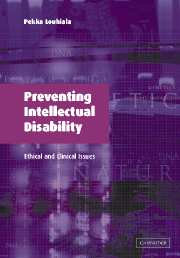Book contents
- Frontmatter
- Contents
- Acknowledgements
- 1 Introduction
- 2 On the definition of intellectual disability?
- 3 Epidemiology of intellectual disability
- 4 Prevention of intellectual disability: general issues
- 5 Prenatal diagnosis and screening
- 6 Genetic counselling
- 7 Why should intellectual disability be prevented?
- 8 Moral status and intellectual disability
- 9 The ethics of prevention in practice: three syndromes
- 10 Conclusion
- References
- Index
6 - Genetic counselling
Published online by Cambridge University Press: 09 August 2009
- Frontmatter
- Contents
- Acknowledgements
- 1 Introduction
- 2 On the definition of intellectual disability?
- 3 Epidemiology of intellectual disability
- 4 Prevention of intellectual disability: general issues
- 5 Prenatal diagnosis and screening
- 6 Genetic counselling
- 7 Why should intellectual disability be prevented?
- 8 Moral status and intellectual disability
- 9 The ethics of prevention in practice: three syndromes
- 10 Conclusion
- References
- Index
Summary
Genetic counselling is ‘what happens when an individual, a couple or a family asks questions of a health professional [the genetic counsellor] about a medical condition or disease that is, or may be, genetic in origin’ (Clarke 1994, p. 1). The focus may be back in time (e.g. when a family is seeking an explanation for what has happened in the past) or forward in time (e.g. when a couple wants to know about their reproductive options). The ‘patients’ or clients are generally healthy, and with a few exceptions the whole clinical genetic practice is not involved with therapy. As Angus Clarke expressed it: ‘We dispense words, not tablets’ (Clarke 1997a, p. 165). Clarke is a clinical geneticist himself and thus an ‘insider’. The American sociologist Charles L. Bosk has given an ‘outsider's’ view, which summarises some of the tensions of the process: ‘Genetic counselling as a service is generally a matter of transferring information to individuals who request it, and then leaving those individuals alone to make the tragic choices based on that information’ (Bosk 1992, p. xix).
Counselling centres were started in the USA as part of the eugenics movement already in 1915. This was not, however, counselling in the above sense; instead it coincided with the prevailing eugenic ideology. In the 1930s interest in genetic counselling declined because of the greater emphasis on the role of the environment in human behaviour (Hoedemaekers 1998).
- Type
- Chapter
- Information
- Preventing Intellectual DisabilityEthical and Clinical Issues, pp. 69 - 85Publisher: Cambridge University PressPrint publication year: 2003



